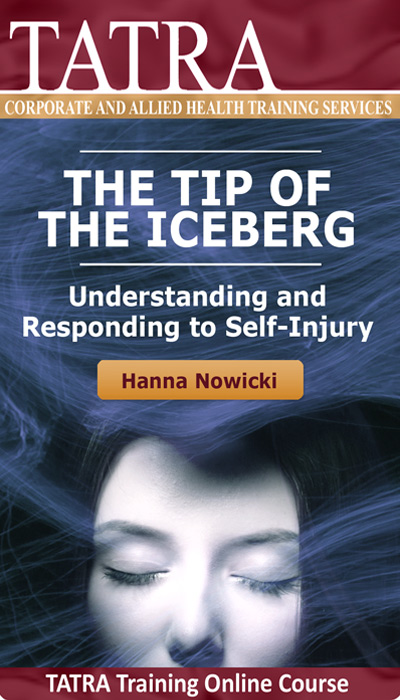29 Apr The Tip of the Iceberg: Understanding and Responding to Self-Injury

Mental health professionals have struggled to understand self-injury for decades, with varying degrees of success and compassion. Self-injury can be a confusing behaviour to not only professionals but also to the teachers, parents and other loved ones. Treatment is never straight forward or short but it is important to know that self-injury is perfectly treatable as long as we know how to approach treatment and how to implement it.
In the past, because of the complexity of self-harming behaviours and a variety of issues involved in self-injury, clinical responses to self-injury have often been moderately beneficial, and in some cases, distinctly harmful. It is never a good idea to go too fast or request that the person simply “stops”. In all cases, the road to recovery is a journey but the successful recovery will come in the end of this process.
This course has been developed specifically to help practitioners feel more confident about responding to clients who present with self-injury. It will offer helpful guidelines to workers who wish to improve their capacity to respond effectively to clients who self-harm. A particular focus has been put on providing therapists, counsellors and other such professionals with a range of activities and techniques that can be used during the sessions or that can be utilized as homework.
All the information in this course has been translated into activities and exercises that can be used in therapy sessions as a resource conveying the same information to the client and using client’s language. You will be equipped with a range of suggestions and tools that can be immediately utilized in order to increase your client’s self-awareness and capacity to deal with distress instead of using self-injury as a coping tool.


The program will cover:
- Understanding self-injury and its context
- Important differences between self-injurious and suicidal behaviours
- Exploration of the functions self-injury serves
- Techniques to increase client’s self-awareness
- Models of self-injury
- Strategies to reduce or stop self-injury
- Various treatment approaches which can be integrated to create an effective recovery model


This online workshop will give you instant access to 9 sessions of video content, accessible via streaming on our website, as well as downloadable supplemental notes and case studies. You can view the course content in your own time, there is no time limit on access.
The duration of this workshop is 5 learning hours. A certificate of completion will be generated upon finishing the course and completing a short multiple-choice assessment test. Please consult your professional organisation/association to confirm whether you are able to claim any CPD points/hours for this online workshop.



 Hanna Nowicki (Postgrad. Soc. Work, LLB, BA Psych)
Hanna Nowicki (Postgrad. Soc. Work, LLB, BA Psych)